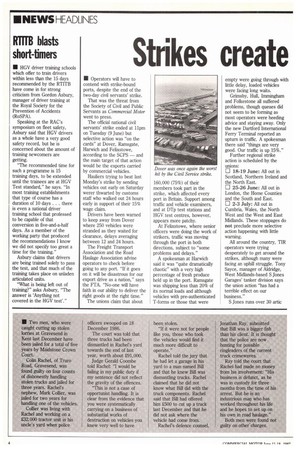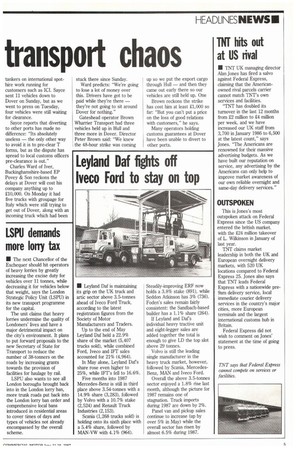Strikes create transport chaos
Page 6

Page 7

If you've noticed an error in this article please click here to report it so we can fix it.
• Operators will have to contend with strike-bound ports, despite the end of the two-day civil servants' strike.
That was the threat from the Society of Civil and Public Servants as Commercial Motor went to press.
The official national civil servants' strike ended at 1 lpm on Tuesday (9 June) but selective action was "on the cards" at Dover, Ramsgate, Harwich and Felixstowe, according to the SCPS — and the main target of that action would be the exports carried by commercial vehicles.
Hauliers trying to beat last Monday's strike by sending vehicles out early on Saturday werer thwarted by customs staff who walked out 24 hours early in support of their 15% wage claim.
Drivers have been warned to keep away from Dover where 250 vehicles were stranded as they waited for clearance, delays averaging between 12 and 24 hours.
The Freight Transport Association and the Road Haulage Association advise operators to check before going to any port. "If it goes on it will be disastrous for our export drive as a nation," says the PTA. "No-one will have faith in our ability to deliver the right goods at the right time."
The unions claim that about 160,000 (75%) of their members took part in the strike, which affected every port in Britain. Support among traffic and vehicle examiners, and at DTp test stations and HGV test centres, however, appears more patchy.
At Felixstowe, where senior officers were doing the work of strikers, traffic was moving through the port in both directions, subject to "some problems and delays."
A spokesman at Harwich said it was "quite dramatically chaotic" with a very high percentage of fresh produce held up in the port. Ramsgate was shipping less than 20% of its normal loads and although vehicles with pre-authenticated T-forms or those that were empty were going through with little delay, loaded vehicles were facing long waits.
Grimsby, Hull, Immingham and Folkestone all suffered problems, though queues did not seem to be forming as most operators were heeding advice and staying away. Only the new Dartford International Ferry Terminal reported an upturn in traffic. A spokesman there said "things are very good. Our traffic is up 15%."
Further regional strike action is scheduled by the unions: CI 18-19 June: All out in Scotland, Northern Ireland and the North East.
El 25-26 June: All out in London, the Home Counties and the South and East. 0 2-3 July: All out in Cumbria, Wales, the North West and the West and East Midlands. These stoppages do not preclude more selective action happening with little warning.
All around the country, TIR operators were trying desperately to get around the strikes, although many were facing an uphill struggle. Tony Sayce, manager of Aldridge, West Midlands-based S Jones Garages' tanker division says the union action "has had a terrible effect on our business."
S Jones runs over 30 artic tankers on international spothire work running for customers such as ICI. Sayce sent 11 vehicles down to Dover on Sunday, but as we went to press on Tuesday, four vehicles were still waiting for clearance.
Sayce reports that diverting to other ports has made no difference: "Its absolutely useless — the only other way to avoid it is to pre-clear T forms, but as the dispute has spread to local customs officers pre-clearance is out."
Charles Ward of Iver, Buckinghamshire-based EP Povey & Son reckons the delays at Dover will cost his company anything up to 210,000. On Monday it had five trucks with groupage for Italy which were still trying to get out of Dover, along with an incoming truck which had been stuck there since Sunday.
Ward predicts: "We're going to lose a lot of money over this. Drivers have got to be paid while they're there — they're not going to sit around Dover for nothing."
Gateshead operator Brown Wharrier Transport had three vehicles held up in Hull and three more in Dover. Director Peter Brown said: We knew the 48-hour strike was coming up so we put the export cargo through Hull — and then they came out early there so our vehicles are still held up. One Brown reckons the strike has cost him at least £1,000 so far: "But you can't put a price on the loss of good relations with customers," he says.
Many operators holding customs guarantees at Dover have been unable to divert to other ports.
























































































































